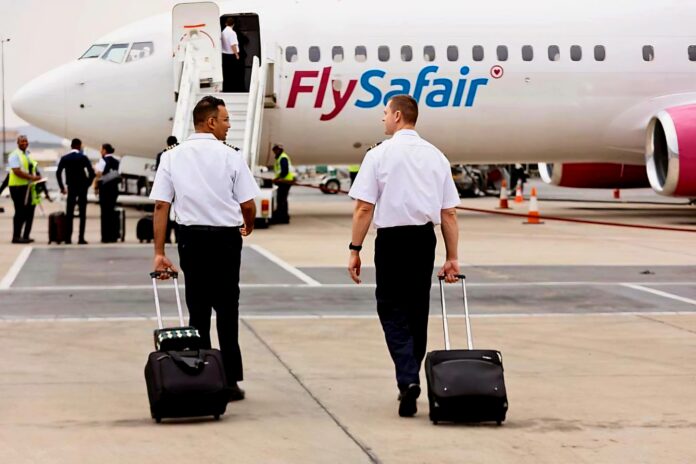FlySafair, a prominent South African domestic airline, is battling to maintain its operations as it faces the risk of being grounded or fined.
The Air Services Licensing Council (ASLC) has ruled that the airline’s shareholding structure does not comply with South African aviation legislation, echoing a similar decision by the International Air Services Council (IASC).
At the heart of the issue lies the ASLC Act of 1990, which mandates that airlines operating domestically must be majority-owned by South African citizens. FlySafair’s ownership structure is under scrutiny because ASL Aviation, an Irish company, is alleged to own nearly 75% of the airline’s shares—both directly and through subsidiaries. This classification has led the ASLC and IASC to deem FlySafair a foreign entity, a status that contravenes South African law.
Kirby Gordon, chief marketing officer at FlySafair, has pushed back against these findings, describing the controversy as more of an administrative matter than a substantive one. “It is more of a matter of paperwork really than anything to do with nuts and bolts,” Gordon explained. “We really hope that sanity will prevail across the board, and we can prevent any undue harm to the flying public and our employees.”
FlySafair ownership structure under the spotlight
The ASLC has raised concerns about FlySafair’s use of trusts and companies as shareholders. Its ruling states that domestic airlines must have majority ownership by individual South African citizens, not entities such as trusts or corporations. Currently, FlySafair’s ownership includes a 49.86% shareholding by the Safair Investment Trust, which is ultimately 100% owned by ASL Aviation, in addition to the 25% shareholding directly held by ASL Aviation.
FlySafair argues that this interpretation is flawed, noting that requiring individual shareholders is unrealistic in an industry where individuals often lack the capital to own airlines. To resolve the matter, FlySafair has sought clarity from the courts through a declaratory order, with support of the Minister of Transport.
Implications for the airline industry
FlySafair has warned that the ASLC’s interpretation could have far-reaching consequences for the aviation sector. “If upheld, it could disrupt the operations of numerous airlines and air service operators, impacting flight schedules, ticket prices, and the overall travel experience for passengers,” the airline said in a statement.
This is not the first time FlySafair has faced scrutiny over its operational practices in recent months. In early January 2025, the airline became the focus of an ongoing investigation by the National Consumer Commission into its overbooking practices. (see the NCC official media statement here). This comes after an unsatisfied customer shared his unpleasant experience with FlySafair’s practice of overbooking flights on X, and the carrier’s subsequent public admission on the social media platform that overbooking is a common practice “to keep flights affordable for passengers”.
Despite these challenges, the airline said it remains optimistic as it strives to minimise disruptions for both passengers and employees.
A prompt resolution over its ownership compliance is, however, essential to prevent a recurrence of a major flight disruptions such as the grounding of South African Airways in December 2024, which resulted from a breakdown in wage negotiations between SAA and the South African Airways Pilots’ Association (SAAPA).


